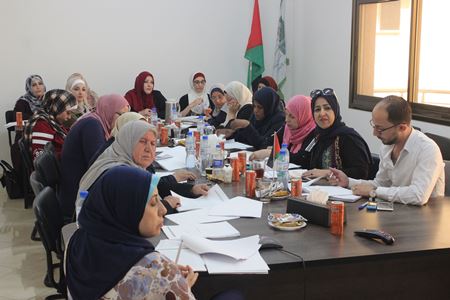|
Presentation of report on gaps in policies and procedures in Sharia and Ecclesiastical courts
Gaza City – As part of coordination and cooperation with the “Personal Status Law Coalition” in efforts to amend and reform the Personal Status Law, policies and procedures applied by Sharia and Ecclesiastical courts, MIFTAH held a special session on July 17 in which it presented the preliminary results of a special report on the measures and policies of Sharia and Ecclesiastical courts in the West Bank and Gaza Strip. The session was also held in parallel with the national efforts to develop family laws based on a women’s rights approach, which is based on personal status laws enacted in the West Bank and Gaza Strip. In this regard, Khadijeh Hussein Zahran presented the report, based on the principle of equality in CEDAW [The Convention on the Elimination of all Forms of Discrimination Against Women], which highlights the rights gaps in procedures and policies enacted in Sharia and Ecclesiastical courts. She explained that these gaps constitute an obstacle to women and girls’ access to justice, particularly in matters relating to the age of marriage, legal personality, divorce, guardianship, custody and joint funds. The report also addressed gender relations, the patriarchal system and the patriarchal representations in personal status laws. It broached the multiple laws to which individuals of the same country are subject to according to their religion and the subsequent rights and obligations according to their respective religious denominations. This has created a disruption in the principle of equality in accordance with the principle of citizenship, which comprises the collective identity of citizens and leads to multiple identities based on doctrinal differences and religious sects within the same homeland. Meanwhile, Zahran maintained that the Palestinians’ internal division posed a major challenge to accessing information regarding the procedures and regulations enacted in the Gaza Strip, in addition to the existing patriarchal culture in official institutions, which obscures procedural information considered confidential in some religious institutions. The session gave added value to the report through the information on the Gaza Strip in addition to introducing the researcher to the approaches of institutions and individuals towards changing policies and procedures in courts. Furthermore, member institutions of the “Personal Status Law Coalition” in Gaza expressed the importance of the report, which reflected the reality inside Shariya and Ecclesiastical courts and the discrimination experienced by women and girls. At a later stage, the report will be presented to members of the coalition in the West Bank in order to produce a final copy, which will include the proposed policies and alternatives that contribute to enhancing access to justice for women. MIFTAH coordinator in the Gaza Strip, Shadia Al Ghoul said the session was part of MIFTAH’s efforts to have an impact at the level of policies and legislation to guarantee protection, justice and respect of liberties for all sectors of Palestinian society, especially women and youth, in line with international conventions and UN resolutions on human rights. She continued that it was also part of national efforts to support the Women’s Peace and Security agenda and press towards implementation of CEDAW in Palestine. This session is part of MIFTAH’s Oxfam-funded “Conflict and Fragility,” project.

http://www.miftah.org |